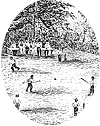In Honolulu in 1855
| Date of Game | 1855 |
|---|---|
| Game | Wicket |
| Location | Honolulu, HI, United States |
| Modern Address | |
| Field | Add Field Page Punahou school |
| Home Team | Add Club Page |
| Away Team | Add Club Page |
| Score | |
| Has Source On Hand | No |
| Innings | |
| Number of Players | |
| NY Rules | No - Predecessor |
| Tags | |
| Description | Punahou school was playing wicket in 1855. An 1859 wicket game is already entered into protobnall for Honolulu. [A] "In 1855 the new game of wicket was introduced at Punahou [School] and for a few years was the leading athletic game on the campus. . . . [The] fiercely contested games drew many spectators from among the young ladies and aroused no common interest among the friends of the school." [B] "One game they all enjoyed was wicket, often watched by small Mary Burbank. Aipuni, the Hawaiians called it, or rounders, perhaps because the bat had a large rounder end. It was a forerunner of baseball, but the broad, heavy bat was held close to the ground." [3] Through further digging, John Thorn traces the migration of wicket to Hawaii through the Hawaii-born missionary Henry Obookiah. At age 17, Obookiah traveled to New Haven and was educated in the area. He died there in 1818, but not before helping organize a ministry [Episcopalian?] t\in Hawaii that began in 1820. Sources: [A] J. S. Emerson, "Personal Reminiscences of S. C. Armstrong," The Southern Workman Volume 36, number 6 (June 1907), pages 337-338. Accessed 2/12/10 via Google Books search ("punahou school" workman 1907). Punahou School, formerly Oahu College, is in Honolulu. [B] Damon M. Ethel, Sanford Ballard Dole and His Hawaii [Pacific Books, Palo Alto, 1957], page 41. [C] John's source is the pamphlet Hawaiian Oddities, by Mike Jay [R. D. Seal, Seattle, ca 1960]. [Personal communication, 7/26/04.] Comment:
Damon added: "Aipuni, the Hawaiians called it, or rounders, perhaps because the bat had a larger rounder end.t was a a forerunner of baseball, but the broad, heavy bat was held close to thee ground." |
| Sources | Baseball Chronology, with additions. |
| Source Image | [[Image:|left|thumb]] |
| Has Source On Hand | No |
| Comment | See Chronologies 1855c.10 Edit with form to add a comment |
| Query | Edit with form to add a query |
| Submitted by | Bruce Allardice |
| Submission Note | |
| First in Location | |
| Players Locality | |
| Entry Origin | |
| Entry Origin Url |
Comments
<comments voting="Plus" />
